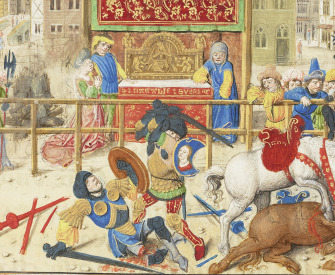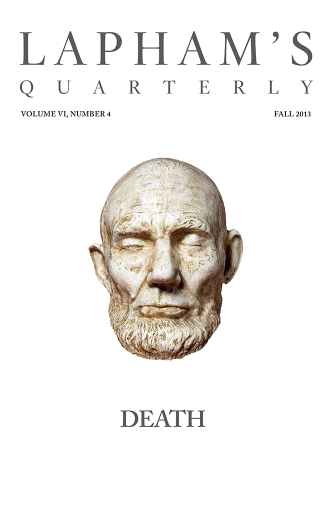The zeal of the Christians against the Jews in England, which had been kindled a little before at London, broke out fiercely. It was not indeed sincere, that is to say, solely for the sake of the faith, but in rivalry for the luck of others or from envy of their good fortune.
Bold and greedy men thought that they were doing an act pleasing to God, while they robbed or destroyed rebels against Christ and carried out the work of their own cupidity with savage joy and without any, or only the slightest, scruple of conscience, God’s justice, indeed, by no means approving such deeds but cunningly ordaining that in this way the insolence of that perfidious people might be checked and their blaspheming tongues curbed.
The first outburst against them occurred, at Lynn, a city renowned for its thriving commerce, where many of this people dwelled, overbearing by their numbers, the greatness of their wealth and the protection of the king. When a certain one of them was converted from their superstition to the Christian faith, they, thirsting for his blood as that of a deserter and traitor, sought for an opportunity of gratifying their malice, and on a certain day seizing their arms attacked him as he was passing, but he retreated to the nearest church. But the madmen did not desist and began to besiege the church with perverse fury and attack in order to break the doors and drag the fugitive out to punishment. A huge clamor is raised by those who were in the same church. Christian help was demanded with loud voice. The shouting and the reports inflame the Christian folk; those who were near run up in arms on hearing the shouts, those far off when they heard the rumors. The inhabitants of the place went to work half-heartedly for fear of the king, but the young foreigners, of whom a great many had come there on business, attacked the insolent assailants more stoutly. They, however, giving up their siege of the church, commenced to fly when they could no longer support the attack of the Christians. A few being slain during the flight, their houses were stormed and pillaged by the Christians, and burned by the avenging flames, and many of them fell victims to the fire or sword of the enemy. On the following day, a certain Jew coming up, a distinguished physician who was friendly with and honored by the Christians for the sake both of his art and of his own modesty, commenced to deplore the slaughter of his people rather strongly and, as if prophesying vengeance, aroused the still smoldering rage. The Christians soon seized him and made him the last victim of Jewish insolence. The young foreigners, loaded with booty, sought their ships and quickly went away to avoid inquiry by the king’s officers. But the inhabitants of the place, when they were interrogated about the matter by the officials, attributed the deed to the foreigners who had already gone away.
From History of English Affairs. On September 3, 1189, Richard the Lionheart became king of England. Jews had been barred from the coronation, and those who showed up bearing gifts were stripped and whipped. Rumors of the new king’s anti-Semitism spread quickly; a mob attack on London Jewry spread through the country until reaching, by early 1190, the ancient city of York, where local nobles—often in debt to Jewish lenders—led the lower classes in the assault. While serving at a nearby Augustinian priory, William of Newburgh witnessed the events firsthand.
Back to Issue

